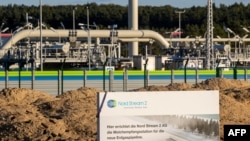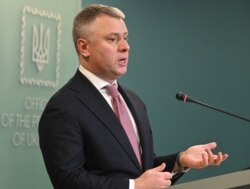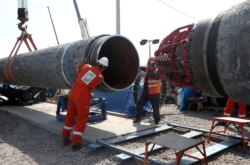Nord Stream 2, the gas pipeline project designed to double the volume of Russian gas delivered to Germany via the Baltic Sea, continues to be a contentious topic in U.S.-European relations. It was hoped a statement issued by U.S. and German officials on Wednesday would ease tensions, but it instead drew resistance from some members of the U.S. Congress and criticism from Eastern Europe.
The joint statement followed last week's summit between U.S. President Joe Biden and German Chancellor Angela Merkel, who agreed to disagree on the pipeline. Germany sees it as a business project, and the U.S. sees it as a Kremlin geopolitical endeavor.
The statement vows to ensure that Russia will not misuse the Nord Stream 2 "to achieve aggressive political ends by using energy as a weapon." It also pledges support for Ukraine’s sovereignty, territorial integrity, independence and security through investment in sustainable energy development. Germany also committed to help Ukraine negotiate an extension of the Russian gas transit treaty — about 18% of the European Union's annual natural gas consumption comes from Russia via Ukraine — and promises to respond if Russia uses the pipeline to pressure Ukraine.
VOA on Wednesday spoke with Yuriy Vitrenko, head of the Ukrainian state-owned energy company Naftogaz. Vitrenko was in Washington this week to explain Ukraine's concerns about the new pipeline.
"Nord Stream 2 should never become operational," Vitrenko told VOA’s Ukrainian Service. He argues that if Russia no longer needs Ukraine for gas transit to Europe, Putin will be much more likely to launch a full-fledged military offensive against its Western neighbor, with which it has been at war since 2014. He believes that canceling the State Department's waiver on the sanctions against Nord Stream 2 AG—the company behind the pipeline —could thwart activation of Nord Stream 2, all segments of which were mechanically connected last month.
The following are excerpts from the interview, which has been translated into English and edited for brevity and clarity.
VOA: Construction of Nord Stream 2 is almost finished. Do you think it is still possible to prevent its completion?
Vitrenko: Completion is a technical issue. The real question is for this pipeline to never become operational so that it does not transport gas to Europe.
VOA: What was the reaction to your position in your meetings here in Washington?
Vitrenko: Very positive. There is bipartisan support. Both major U.S. parties, Democrats and Republicans, support our fight against Nord Stream 2. They understand that the project should never become operational.
VOA: What is the reaction of Biden administration?
Vitrenko: We see statements from the Biden administration that it is a bad project, that the U.S. administration is opposed to it. There are technical issues, though, related to the fact that the most effective sanctions have not been used so far. However, Secretary of State Antony Blinken told Congress [during committee hearings in June] that the administration will follow the events and might still utilize the sanctions.
Now the Swiss company Nord Stream 2 AG has applied to be certified as the pipeline's operator. We believe that this company should be sanctioned, because in reality this is a Russian company and it is key to the project.
VOA: What about the European rules governing the pipeline?
Vitrenko: The operator has to obtain certification from the German regulator. However, the European rules, the so-called Third Energy Package, prevent a single person or a group of people from simultaneously controlling the production, sale and transportation of gas. So, it is against the European rules for Gazprom and Putin to control production of gas in Russia and its transportation to Europe. These rules must apply to this case.
VOA: Do you think it is possible to compensate Ukraine for the negative outcomes from Nord Stream 2?
Vitrenko: Can a country be compensated for facing critical threats to its security? Ukraine is the target of Russia's military aggression. We also say that the project is the symbol of Western corruption — it goes against Western values, so it discourages Ukraine from market reforms.
VOA: What is the primary threat that Nord Stream 2 poses to Ukraine?
Vitrenko: If physical flow of [Russian] gas through Ukraine stops, the risk of full-scale military aggression by Russia would go up substantially. Russia will expect nothing much from Europe beyond expressions of deep concern if the military actions do not have an impact on European consumers.
VOA: While in the U.S. last week, German Chancellor Angela Merkel said that Germany "will be actively acting should Russia not respect Ukraine's right as a transit country." Do you think Germany will really limit Russian gas exports to Europe in this scenario?
Vitrenko: Frankly, I don't think that if there were a full-fledged war in Ukraine and everybody knew [a substantial amount of gas] was coming from the Kremlin, Germany would impose effective sanctions on gas exports to Germany. That would mean German consumers would go without gas and heat in winter.
Let's be realistic. Let's anticipate the risks and prevent them from happening or we will find ourselves in the situation when nothing can be done except to express deep concern, as has been the case with the occupation of Crimea and parts of Donetsk and Luhansk.
VOA: What about the assurances that Germany can guarantee transit of Russian gas via Ukraine?
Vitrenko: I cannot understand how Germany can guarantee transit of gas via the territory of Ukraine if neither of those countries is in charge of producing and transporting the gas. Theoretically, such guarantees could come only from Russia. But at what price? Ukraine already had the Budapest Memorandum [a 1994 document in which the United States, Russia and Britain provided security assurances to Ukraine, under which Kyiv agreed to give up its nuclear arsenal], which was supposed to guarantee its security. We don't find the idea of Budapest Memorandum No. 2 appealing.
How can we believe if somebody promises us something instead of Russia? You cannot trust that scenario even if it were Russia itself making the promises.







